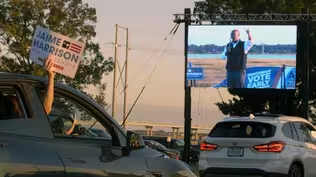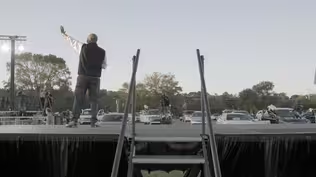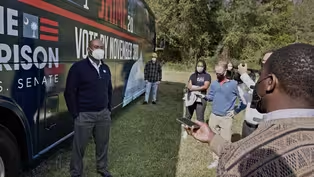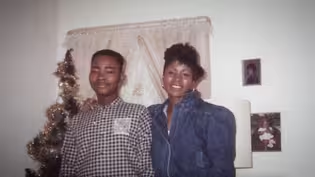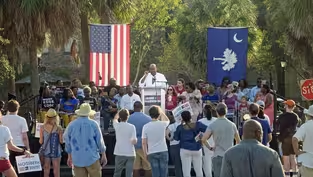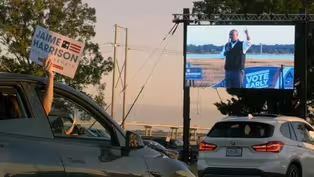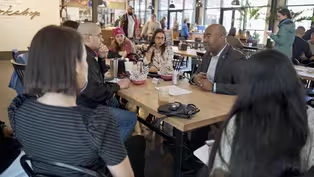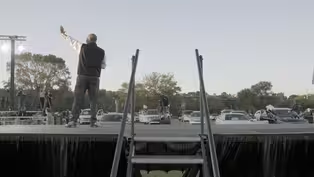
Beyond the Lens with Emily Harrold and Charlamagne Tha God
Clip: Season 8 Episode 2 | 23m 19sVideo has Closed Captions
A conversation with filmmaker Emily Harrold and executive producer Charlamagne Tha God.
Emily Harrold and Charlamagne Tha God talk with Tina McDuffie about IN THE BUBBLE WITH JAIME, their documentary film following Jaime Harrison who ran a 2020 Senate campaign against Lindsey Graham during the COVID-19 pandemic. The filmmaker and executive producer discuss race in America through red and blue politics, and share what is means to be from South Carolina.
Problems playing video? | Closed Captioning Feedback
Problems playing video? | Closed Captioning Feedback
Funding provided by the Corporation for Public Broadcasting, John D. and Catherine T. MacArthur Foundation and Wyncote Foundation.

Beyond the Lens with Emily Harrold and Charlamagne Tha God
Clip: Season 8 Episode 2 | 23m 19sVideo has Closed Captions
Emily Harrold and Charlamagne Tha God talk with Tina McDuffie about IN THE BUBBLE WITH JAIME, their documentary film following Jaime Harrison who ran a 2020 Senate campaign against Lindsey Graham during the COVID-19 pandemic. The filmmaker and executive producer discuss race in America through red and blue politics, and share what is means to be from South Carolina.
Problems playing video? | Closed Captioning Feedback
How to Watch Local, USA
Local, USA is available to stream on pbs.org and the free PBS App, available on iPhone, Apple TV, Android TV, Android smartphones, Amazon Fire TV, Amazon Fire Tablet, Roku, Samsung Smart TV, and Vizio.
Buy Now
Providing Support for PBS.org
Learn Moreabout PBS online sponsorshipMcDUFFIE: All right, we are talking to Emily Harrold and Charlamagne tha God, who are, uh, Charlamagne is the executive producer and Emily Harrold is the director.
Welcome to both of you.
- Thank you.
- Thank you, Tina.
Thank you for joining us.
Okay, so, Emily, I'm gonna start with you.
Tell us a little bit about your background.
Sure.
So I'm born and raised, uh, from Orangeburg, South Carolina.
Um, and I've been a documentary filmmaker for about a decade Um, and I've been a documentary filmmaker for about a decade Um, and I've been a documentary filmmaker for about a decade and really interested in, you know, Southern politics in particular.
This is my second film following a political race.
And, you know, it was just really very exciting to get to make, um, and to get to really see the inner workings of this campaign.
Um, you're from South Carolina, Charlamagne.
We also know that you are from South Carolina, but how did the two of you connect around this film?
Uh, or were you connected before the film?
Yeah, we were connected before the film.
Emily also directed While I Breathe, I Hope about my good friend Bakari Sellers.
So when, you know, Bakari Sellers approached me about his documentary and what he was doing with Emily, and he asked me to be a E.P.
of that, uh, you know, that, that was a no-brainer for me.
So, when Emily came with the In the Bubble idea, I was, "Of course."
Like, you know, any story from South Carolina of this magnitude that is, that is documenting history accurately, I, I want to be a part of it.
And Emily does a fantastic job with it.
And that's what I was actually gonna ask you was, uh, why did you feel it was important to attach yourself to this particular film?
Is it-- it is South Carolina.
It is Jaime Harrison running against the, you know, the establishment of Lindsey Graham.
Um, we also had a pandemic uh, as we were filming this documentary, as well.
So we have some other elements besides just South Carolina politics in here.
So talk about what it was like to try to capture all of the things that were going on in this film.
Sure.
Uh, I mean, we knew going into it that this campaign was gonna be, you know, like Charlamagne said, historic for a variety of reasons.
Um, first and foremost, you know, a global pandemic.
None of us have ever experienced that.
Uh, and what did that look like for all of these political campaigns, not just, you know, this one in particular.
And so that we felt like was really, really unique.
Uh, and if we could pull it off, we thought it would be just a very interesting story.
We really had no idea what was gonna happen.
Um, and so that was a big part of it is, you know, what, what does it look like to try and campaign when people can't go outside?
Um, how do you connect with voters?
How do you reach people and understand what they're interested in, what they care about?
And then the second part was, I've known Jaime for almost my entire life.
And to see what he was doing was just personally very, very exciting.
And I really wanted to make sure it was documented, um, and that, you know, the story got out beyond, beyond just South Carolina and beyond just the local, um, the local race.
And so, Charlamagne, as you and Emily were communicating, as you were making the film, what were some of the things that came up?
Difficulties, you know, feelings, you know, we think about South Carolina.
The reality is very different for Black folks than it is for white folks.
Yeah, I mean, when I was, you know, because I was down there actually campaigning, you know, with Jaime, you know, personally, I felt the energy for Jaime.
You know, that's what I'll that's when I have, you know, these conversations about politics.
The thing that frustrates me about a lot of politicians, I think a lot of times that, you know, they're they're in their in their offices or, you know, they're in D.C. on the Hill, and they're creating policy, but they're not really talking to the people they're creating policy for.
And, you know, Jaime actually did that.
You know, he was literally going door to door, you know, not knocking on people's doors, talking to people.
You know, he was, you know, doing the Barbershop campaign.
He was in the barbershop, you know, talking to people.
So just being home, I felt the energy for Jaime Harrison.
And when I wasn't home, I was getting calls about, you know, Jaime Harris.
And so that's what made me feel like, you know, I he could win this thing and then we started to see him, you know, raising more money than, you know, than anybody has ever done in the history of the Senate.
And then it was I forgot what I think it was.
The state newspaper endorsed him.
So I was like, whoa, okay.
We got some real.
Yeah.
So I, I personally didn't necessarily see the difficulty, even though I know it probably was a bunch of them.
What I saw was a lot of people, Black and white, energized for something new in South Carolina politics.
So, you know, when he when he lost the way he did, that was the biggest surprise for me.
But then I also had to take a step back and say to myself, well, it's still is South Carolia.
You know, so, so so regardless of what I may have thought I saw on the ground, you know, there's all types of things that happened on on on election Day that that, you know, that could possibly not going in somebody like Jaimes favor.
And so you're-- there are two different perspectives here on the screen.
Emily, you are, uh, you're not Black.
(chuckling): You're a White woman.
And, Charlamagne, you're a Black man.
Tell me what the, what you noticed, you know, living, growing up in South Carolina.
You know, um, Charlamagne, um, I love Wu-Tang.
And so I was listening to Method Man talking about politics.
And, uh, his perspective was "when Bill Clinton was in office, my people were doing better."
Um, is that something that you recognize growing up in South Carolina-- when there were certain people in office there was a better situation for, for Black people?
Well, you know, Method Man is a little older than me.
So when I was younger, you know, the things I remember about Bill Clinton is Bill Clinton playing saxophone on Arsenio.
And then I remember all the scandals around Bill Clinton.
But yes, I do remember adults around me, you know, saying things like that, and, you know, saying, saying, you know, things like, you know, Bill Clinton was good for the economy and, you know, people were employed under Bill Clinton.
But what I always try to tell folks, man, is always look at what's happening with the least of us.
I, I was raised on a dirt road in Moncks Corner, South Carolina in a single-wide trailer.
You know, the most my mother ever made in a year at one time was $30,000.
She was an Eng-- she was an English teacher, you know, in the Berkeley County school system.
And, you know, my father, he was into construction and, you know, he was a hustler.
You know, he dibbled and dabbled in a little bit of everything.
I was fully aware that we weren't, uh, you know, well-off in any way, shape or form.
And that's why I say you always have to see what's going on with the least of us.
Go to those rural areas in places like South Carolina and talk to them and tell them if they're feeling the relief, you know, from, from said government, whether it's federal or local.
And one thing I, I can personally say, I haven't really seen the hood's condition change under anybody.
Emily, I want to give you a chance to answer that same question.
Growing up, did you recognize the differences in, in Black and White, and how people were treated in South Carolina?
Um, of course.
Uh, you know, growing up in Orangeburg, Orangeburg is a majority African American community, uh, and I was one of the few White kids in the public school system.
Um, and so race was always present, and it was always part of the subtext.
And it is part of the subtext.
Um, and I think you see that, you know, even today, in the, in a political story like this one, um, you know, I think, unfortunately, race largely defines how people vote in South Carolina.
And so one of the things that we were exploring in the film is what is the math for someone like Jaime to win?
And when it is so racially divided, it makes it a really, really tough thing to try and figure out what to do.
Because one of the things that was really interesting is Jaime was very idealistic in this campaign, and that was amazing to watch.
Um, but that idealism then backfired to some extent.
Um, you know, as you, you know, when you watch the film, you'll see part of that play out.
Um, and so, you know, how do you appeal to a broad coalition of people?
Um, it's, it's a difficult thing when you live in a state like South Carolina, and there's still so much division that exists.
HARRISON: Oh my, oh my, oh my.
William, you can have a seat over there, buddy.
(siren whoops) MAN (over bullhorn): Jaime Harrison, what is your Black agenda?
Uh, my, my, my Black agenda is all these Black people who are out here right now, sir.
(shouting): Can you feel it?
(crowd cheers) - (man shouting indistinctly) - I am so happy.
- ...at all.
- I am so happy to be here.
Sir.
- You have not mentioned race at all.
- Sir, thank you.
I'm a Black man who grew up poor in South Carolina, sir.
- (man continues shouting) - Yes, thank you.
Read my Rural Hope agenda, sir.
Thank you.
Um, Charlamagne, do you think that it is fair to ask a Black candidate to have a Black agenda?
I think it's fair to ask every candidate to have a Black agenda.
And I think both parties should have Black agendas, the Democrats in particular, because of how we show up for them all the time.
But, you know, it really bothers me that we're in a, in a place in this country where people are either trying to erase the history of Black people, or don't even want to acknowledge the history of Black people.
You see what Nikki Haley's going through right now by saying racism never existed in this country, but, you know, the Vice President Kamala Harris, you know, before this week, you know, said America wasn't a racist country.
But we got to discuss the history of racism in America.
And it's just strange to me that we just can't be honest about racism in America.
Or if they're, if they are honest, then they could, you know, particularly turn off these hypothetical swing voters.
Or if having a Black agenda, or saying you're gonna do things specifically for Black people, turns off these hypothetical swing voters.
It's just, if you're, if you're against somebody having a Black agenda, if you're against the LGBTQ agenda, if you're against, you know, an agenda for women, do I really want your support?
So let me, let me, let me, let me double back here, because, uh, in the film, it looked like Jaime was really discouraged by the heckling, um, and someone essentially saying, you know, what are you gonna do for Black people?
So, Charlamagne, I know that you were a huge supporter of Jaime.
Listening to his story, it's much like yours growing up in South Carolina.
Um, were there any conversations about that with him?
Like, hey, why don't we have some kind of, um, you know, what are we specifically going to do to help the quality of life for Black folks in South Carolina?
Well, I think Jaime understands that, being a Black man, you know, and being a Black person in America, being a Black person in South Carolina, I mean, we're all looking for the same thing, and that's just upward mobility.
You know?
So he should be able to speak to, you know, the upward mobility of all, all people.
You know, Black people have such a-- there's such a unique set of circumstances that got us in the position that we're in.
So we're going to need a unique set of circumstances to get it out.
Like, we have these conversations about systemic and structural racism, but if systemic and structural racism, if something was actually done to put us in these positions, then it's gonna take something systemic and structural, you know, to get us out.
And I don't understand, you know, why that is so difficult for politicians.
Um, Emily, let's switch gears.
Take me back to the filming of it, because, at any point, were you concerned about yourself or your crew because we were social distancing, we were masking up and et cetera, et cetera.
So tell me what that process was like, uh, in the filmmaking.
Sure.
So before we started filming, we had many calls with the campaign team trying to negotiate what the access would look like, how close we could get.
Did we need to wear, like, full head-to-toe suits, um, masks?
I think I spent, you know, $300 or $400 just on protective gear, um, before we started shooting.
Um, and then we were testing pretty much every 72 hours.
Miraculously, we were all negative the entire time.
Um, and I think that's, uh, you know, a tribute to the campaign because they were very, very safe.
And that's part of why we called the film In the Bubble with Jaime, because it, it, there was a bubble.
They called it a bubble, um, and who was allowed where.
Um, and it was, you know, in a weird way, you know, they say that you get most creative when you have limits like that.
And so we really had to think creatively about how, how do we make a film with someone we can't, you know, be that close to that's gonna feel really intimate?
Um, and so we gave Jaime a camera.
And so he filmed himself throughout the last two months of the campaign, and so, some of the best material in the film is stuff that he shot himself.
McDUFFIE: It really was.
It's a, it's a great film.
So we know that Jaime Harrison is now the chair of the Democratic Convention, and he did not win the seat.
Why was it still important, um, for people to see this film?
So, yes, it's about his campaign.
And, you know, we're-- this film is airing in 2024.
It's been four years, um, since the story was filmed.
Um, but it's also, I think, a larger-- it's a, it's thematically about a larger issue.
Um, race and politics in the South uh, is something that we are going to continue to debate because it's not going away any time soon.
And for me, the film really kind of encapsulated what-- here is a candidate that has this very idealistic vision about creating a broad coalition that is not based on race in a world where race still so defines our political system.
And so, um, you know, I think that's the conversation and the theme that I want people to be thinking about as they watch the film.
And Jaime's story just happens to be the conduit through which we're exploring that.
Yeah, and it's, it's not about the happy ending all the time, right, Tina?
You know, it's about the process.
And I think, you know, showing people the process, whether it's While I Breathe, I Hope with Bakari Sellers or In the Bubble with Jaime Harrison, you don't know, man.
Sometimes you may not shatter that glass ceiling, but you know you put a lot of cracks in it.
So, you know, you might, somebody might watch these documentaries and, and know what they need to do in order to actually shatter the glass ceiling.
So, I, I think it's fantastic letting people see the process.
Let's talk about Lindsey Graham.
He's had a stronghold in South Carolina for a really long time.
Um, talk a little bit about his impact on the state of South Carolina.
I mean, he's been in elected office, I think, most of my entire life.
So I don't know what South Carolina without Lindsey Graham would look like, which, you know, it's, it's hard to make a comparison when all you know is one, one world and one South Carolina.
Um, you know, I think I remember what Lindsey Graham was like-- and this is what a lot of people say-- um, when John McCain was still alive.
And then you see the Lindsey Graham with Donald Trump.
And I think this campaign in particular brought out a lot of contrasts that I think were really important for people to see.
Um, yeah, I don't... he... Lindsey Graham, but he continues to persist here, and I'm not sure how long that will be, but it seems like, at least, for the foreseeable future.
And Charlamagne, I'm going to ask you, you know the same question, What do you think that Senator Graham has or has not done for the people of South Carolina?
Hmm, that's a great question.
I mean, I agree with Emily.
Like, you know, there was a Lindsey before Trump and there was a Lindsey after Trump.
I think Donald Trump gives a lot of people permission to be who they really are.
You know, and I think once the person shows you who they really are, you know, you should believe them.
I saw recently Lindsey Graham's, you know, comments in response to Liz Cheney when Liz Cheney was saying that would when she sees actually absolutely correct.
when she sees actually absolutely correct.
She's America sleepwalking into, you know, dictatorship.
And, you know, Lindsey basically like I could give a damn about Trump's rhetoric and he just blamed it on, you know, Liz Cheney hating, you know, Donald Trump.
And, you know, he's he said that he cares about things like closing the border and he cares about geopolitical politics.
He feels like Donald Trump is just a better president than Joe Biden.
And it's just a reminder that like, man, you know, people like Lindsey Graham don't have to worry about the things a Black man like myself has to worry about.
They don't have to worry about the things a Black woman like you, Tina, have to worry about.
A white woman like Emily has to worry about, like they're not even thinking about the issues that we care about.
So, you know, when I see stuff like that, it's just like, Man, I wish Jamie would have won you know?
When we think about this story, um, what are you hoping that the next Jaime Harrison takes away from this?
Well, I hope that it inspires another Jaime Harrison.
That, that next young Black person, you know, young Black man, young Black woman, I hope they don't feel discouraged.
And I hope that, you know, a documentary like this, you know, just, just gives them hope.
But one thing I want to, want to say, just about South Carolina in general, and there's a uniqueness to South Carolina.
And, and, you know, if you're not from there, you really, truly don't understand, but there's certain things that bring us together.
You know, we're proud South Car... South Carolinians who just want the right thing to happen.
And I think you see a lot of that in In the Bubble, even though, you know, Jaime came up short, ten points short, you still see a lot of that.
I feel like this documentary reflects that uniqueness that South Carolina has, that if you're, if you're not from there, you didn't grow up there, you didn't live there, you probably don't quite understand.
But I, I bet you, people from South Carolina hear me talking, and they, they get it, And now Jamie doesn't lose by that much.
So what do you attribute it to?
I know the turnout was, what, like 50, 54% for Black folks in the 2020 election.
Do you attribute it to a low voter turnout?
Do you what are some of the the ideas that you're thinking about when it comes to this loss because he didn't lose by that much?
because he didn't lose by that much?
Yeah, I think it's a combination, a combination of low voter turnout.
But then you also have to factor in, you know, the things we can't see like, like, like, like the voter suppression that may have happened.
I learned from people like Stacey Abrams, man, I think that, you know, we probably can do a better job in South Carolina of like really, really, really going in the trenches and activating those people who have never voted.
I was a person who never voted until 2008.
I never voted in an election until President Barack Obama came.
I mean, in the election, local our federal president, Barack Obama, energized me in that way.
So when I see, you know, Stacey really went in the trenches in Georgia and really activated like those people who've never even thought about voting.
So I feel like, you know, I feel like we could do a better job of that.
Like that's that's actually conversations I've had with people.
I've asked those questions of of a lot of people in South Carolina who people respect politically like, man, do you think we could ever turn South Carolina blue like, you know, like Georgia a lot of them feel like we couldn't just because of just because of sheer numbers, you know, of demographics.
But I don't know.
I don't know.
I think we could still do a better job of like activating those people who've never even thought about thought about voting.
And Emily, in the film, we see that things the pace is a little different when we have to start doing things remotely and via Zoom, etc.. How much do you think that that impacted this outcome here?
I think it was significant.
I think if you think about who was more comfortable going out without a mask to interact with people and who was staying home and being safe, I think that is very politically divided there as well.
And I think people felt, you know, why do I risk my health?
And that's actually something Jaime talked about.
It did not make it into the film.
But I think the subtext is there is that he did not want his campaign to cause anybody to get sick or lose their lives.
And so unfortunately, because, you know, his campaign was really focused on that and focus on health and safety, they were not door knocking.
You know, the large events were all drive ins and cars.
So there wasn't that, you know, hand to hand.
Let me shake your hand and tell you who I am.
That just wasn't happening.
And the Republicans were doing that.
Lindsey Graham was doing that.
He was out.
They say all politics is local.
And so how do you get people to show up if you can't meet them and hold their hand and hug them and listen to their story?
And so ultimately, you know, he lost by ten points.
You now you say, yes, that's not a lot.
But at the time, you know, the polling was neck and neck.
So ten points on election night felt like a lot.
And my last question for you guys, when you think about this film-- and for both of you, I'll start with you, Emily-- what did you learn about yourself?
Growing up here, I always wanted to leave, and I did not want to be here.
And now I'm actually back living in South Carolina.
Um, most of the work that I've been doing are South Carolina stories, um, because this is where, this is home, and these are the stories that I know, and I grew up with, and I care about.
Um, and I think making this film was kind of, you know, it was the third film I've done in South Carolina.
It kind of cemented that this is where I need to be, and these are the stories I need to be telling.
CHARLAMAGNE THA GOD: Man, that's-- what Emily said is so on point, 'cause, honestly, that's how I've been feeling.
Honestly, just proud to be from South Carolina.
Like, when I, when I see documentaries like this, that's what it, that's what it does for me.
It just makes me proud to be from South Carolina and it just makes me want to keep shining the light on South Carolina and letting South Carolina know, you know, how special we are.
So when you say, what did I learn, uh, from In the Bubble... ...it's more of a reminder that I am South Carolina.
I, I, I am South Carolina.
And I always say, I feel like if the state could talk, it would sound like me.
But it also would sound like Jaime, and it also would sound like Emily.
It would also sound like Bakari, like, you know, everybody has a different story to tell from South Carolina.
But at the end of the day, you know, we are all South Carolina.
So, that's, it's just a reminder.
Thank you both so much.
Emily Harrold, Charlamagne tha God, we're talking about In the Bubble with Jaime.
I'm Tina McDuffie.
Thank you so much for joining us.
- Thank you, Tina.
- Yes, thank you.
In the Bubble with Jaime | Election Day
Video has Closed Captions
Clip: S8 Ep2 | 1m 27s | Jaime Harrison opens up about the pressures of being a Black Democrat in South Carolina. (1m 27s)
In the Bubble with Jaime | Growing Up Black and in Poverty
Video has Closed Captions
Clip: S8 Ep2 | 56s | Jaime Harrison talks about his family and shares one particularly difficult story. (56s)
In the Bubble with Jaime | Jaime Harrison
Video has Closed Captions
Clip: S8 Ep2 | 32s | Meet Jaime Harrison, 2020 South Carolina candidate running against Sen. Lindsey Graham. (32s)
In the Bubble with Jaime | Preview
Video has Closed Captions
Preview: S8 Ep2 | 30s | Jaime Harrison’s daring Senate race in South Carolina amid COVID-19 and racial prejudice. (30s)
In the Bubble with Jaime | Running for South Carolina
Video has Closed Captions
Clip: S8 Ep2 | 58s | Jaime Harrison and his mother reveal why he is running for South Carolina's Senate seat. (58s)
In the Bubble with Jaime | Trailer
Video has Closed Captions
Preview: S8 Ep2 | 59s | Jaime Harrison’s daring Senate race in South Carolina amid COVID-19 and racial prejudice. (59s)
Providing Support for PBS.org
Learn Moreabout PBS online sponsorshipSupport for PBS provided by:
Funding provided by the Corporation for Public Broadcasting, John D. and Catherine T. MacArthur Foundation and Wyncote Foundation.
